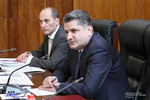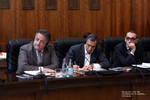Saturday, 20 October 2012
National Competitiveness Foundation Board Of Trustees Holds Regular Meeting
Chaired by Prime Minister Tigran Sargsyan, the National Competitiveness Foundation of Armenia (NCFA) Board of Trustees held its 25th regular session the Office of Government. The meeting was attended by the President’s Chief Advisor, the Ministers of Foreign Affairs, Economy, Finance, Diaspora Affairs, the First Deputy Minister of Economy, the Deputy Minister of Healthcare, the Deputy Chairman of the Central Bank, the NCFA Executive Director, as well as BOT members Ruben Vardanyan, Andre Andonyan, Noubar Afeyan, Haik Bakirjian, Artashes Kazakhetyan.
After discussing and approving the minutes of the previous meeting, the Board of Trustees proceeded to the agenda.
Addressing the meeting, Chairman of the Board of Trustees of NCFA, Prime Minister Tigran Sargsyan provided the details of his government’s new economic policy. “Its essence is that the government should be more proactive in the economic and social life. For the first time since independence, we ushered in an export-oriented industrial policy.”
A comprehensive program was said to have been developed with the help of the World Bank and private sector representatives. It seeks to boost the country’s export potential. According to the Prime Minister, 11 branches of economy had been thoroughly studied and a platform engineered based on the principle of public-private sector partnership. “The State and the private sector are supposed to sign relevant agreements implying mutual commitments in those 11 branches proceeding from a common ideology. The State should clearly state its share of responsibility and the tools to be used under the arrangements, with the private sector to assume the burden of investments and increased level of exports. We have already signed such agreements with the pharmaceutical and brandy sectors, each covering approximately 20 projects. Coming next is the machine building industry. A detailed document is likewise concerning the other sectors.”
Then the Premier dwelt on the economic indicators.
“The growth rates have been stabilizing in the period following the crisis year of 2009. Last year we finished with a 4.2% growth. 7 percent economic growth has been stated during the 8 months of 2012, with a lower than projected budget deficit, which was 2.8 percent in 2011 and will be less than 3% by this yearend. Thus, we are fulfilling our budget-related commitments.
What is most important is that exports grew twice as faster as imports notwithstanding the fact that the trade balance is still negative. The balance of payments deficit-GDP ratio fell by around 4%. Industry and agriculture boasted each 11% rise in the overall growth basket.”
The head of government stressed that the economy is being diversified. In particular, in the wake of the global crisis, the share of construction in the GDP fell from 28 to 14 percent leading to a better balanced economic structure. “Agriculture has come to take the lead in the overall GDP structure with a 20 percent share. Next are coming the processing industry - about 12%, construction - 14%, and the rest goes to the tertiary sector.”
The meeting heard and approved the findings of the annual audit of 2011 as carried out by an arms-length financial auditor. It also looked at the current situation, including the works pertaining to healthcare, tourism, education and the Tatev Revival projects, as well as a number of proposals having to do with the country branding focus.
The BOT approved the 2013 action plan. In conclusion, they discussed organizational matters, admitting Gor Nahapetyan to the BOT membership.











